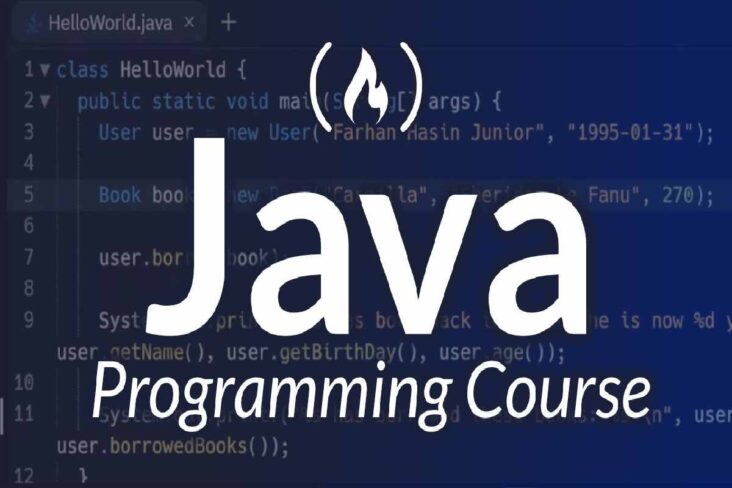Introduction
Java Programming for Beginners today, especially since the deadly pandemic swept the world, the Internet and smartphones have become an integral part of our lives. We use our phones for almost everything we do daily. I used to shop at the mall, wait in line at the bank, and arrange travel at an agency. But now, you can do all this from the comfort of your home via your smartphone. All this is possible thanks to a top programming language called Java.
What is Java

Java is an object-oriented programming philological used in spread environments on the Internet. High-level language that is easy to read and understand. It allows creators to write once and run anywhere (WORA). It means that compiled Java code will run on all Java-compatible platforms without recompiling.
What is Java Used for? – Java Programming for Beginners
It is used not only in computers and mobile devices but also in electronic devices such as televisions, air conditioners and washing machines. Java remains widely used in web consoles, GUIs, web and mobile applications, game development, embedded systems, and desktop applications. Additionally, Java is used to develop software for devices. Online registration forms, banking apps, and internet shopping are all possible thanks to Java.
Java Edition Java Programming for Beginners
Java has three editions. Programmers can learn each of these editions based on the applications they want to build.
- Java Standard Edition – includes core libraries such as Java. Lang and Java. Util.
- Java Enterprise Edition – Includes Java APIs such as JMS, EJB, and JSP/Servlets.
- Java Micro Edition – This edition does use for programming Java on mobile phones, set-top boxes, handhelds, etc. Most applications require Standard Edition. The most widely used edition of Java is Java SE (Standard Edition). Java SE covers the basics of Java.
Java Concepts and Features
Java Concepts
An essential concept of Java is the facility of Object Oriented Programming (OOP). OOP simplifies the development and maintenance of software and applications by providing several ideas, such as:
- Object: An object is an element or entity with a state and behaviour. For example, a dog can remain viewed as an object with colour, breed and name. They have habits such as barking and eating.
- Class: A class is a collection of objects. Types do use to organize code, similar to how a supermarket divides fruits, vegetables, and clinical products into different sections. This blueprint can remain used to create any number of things.
- Constructor: Constructors may look like methods, but they are not. Its name is equal to the class name, and no value do return.
- Estate: Inheritance is the concept of a class inheriting the properties and behaviour of a parent class. Polymorphism: Polymorphism is the process of doing the same task in different ways. It allows programmers to use the same word with different meanings in other contexts.
- Abstraction: Java uses abstraction to hide internal details and show only relevant and essential information.
- Encapsulation: Binding or packaging code and data into a single entity, such as a capsule, is called encapsulation.
Java Function – Java Programming for Beginners
Java has several qualities and features, such as:
- The simple syntax is easy to understand and learn
- Java language is robust
- Fixes bugs that occur in C and C++ languages.
- Java includes features such as garbage collectors and exclusion handling
- As a movable language, Java can run on any stage.
- Java is safe and multitasking
- Java is not as fast as C or C++ but offers better performance than other languages
How Can I Learn Java?
Java is one of the greatest widely used programming languages. The main reason is that Java is inherently versatile, reliable, and compatible. So if you are looking to start a career in programming, this is the most sought-after skill. Here are some advice to get you started.
- Start with Java programming basics (variables, data types, conditionals, arrays, loops, functions).
- Read a book on Java programming to learn basic concepts
- Learn advanced topics (object-oriented programming, inheritance, abstract classes, Java interfaces, collections, abstract classes, exception handling, wrapper classes)
- Practice coding regularly to learn from experience
- Stay up to date with Java articles and new documentation
At some point in their career, developers may ask themselves, “Do I need a Java certification?”
Some employers value certifications. Getting certified can help you advance your career and earn more. Java Professionals gain experience working on projects across multiple industries. In this way, they learn about the needs of different sectors and how to work with developers. On the other hand, some owners value their employees with Java certifications more because they bring value to the company.
Oracle’s Java Certification Path refers to his four certification levels:
- Oracle Certified Associate (OCA)
- Oracle Certified Professional (OCP)
- Oracle Certified Expert (OCE)
- Oracle Certified Master (OCM)
Choose what works best for you. The primary purpose of the Oracle Java Certification exam is to test your knowledge and skills for potential positions in the Java industry.
Conclusion
Almost everything we use in our daily life remains connected to Java. Java Programming for Beginners language is still one of the cutting-edge technologies in the industry, and jobs are in high demand.




GIPHY App Key not set. Please check settings